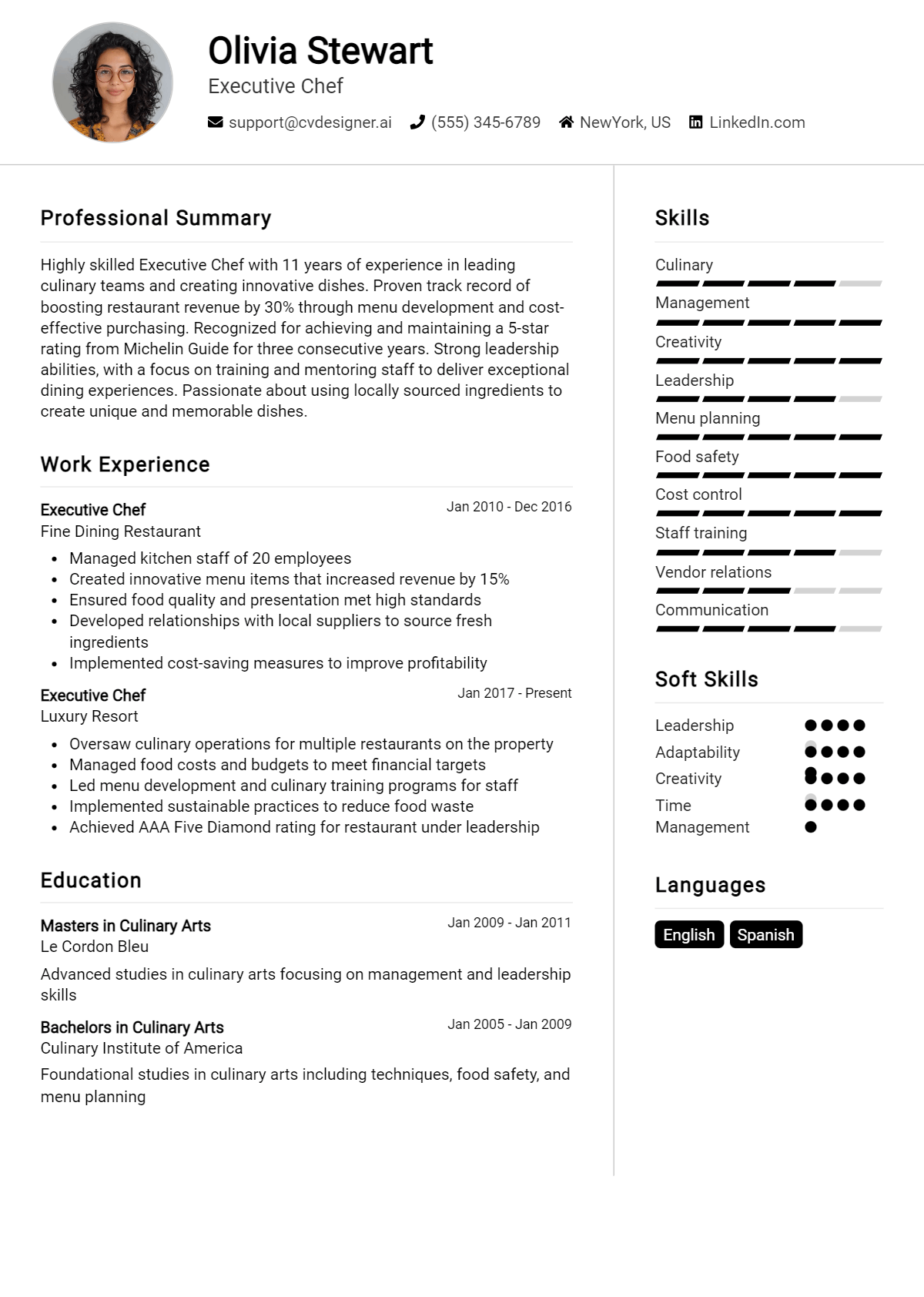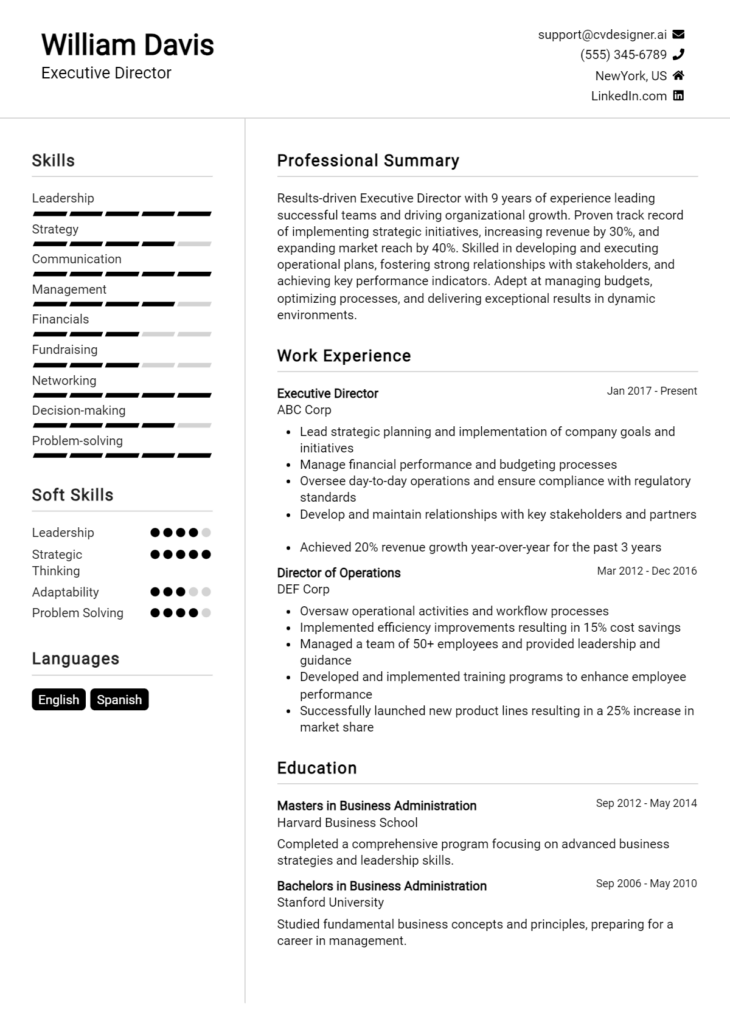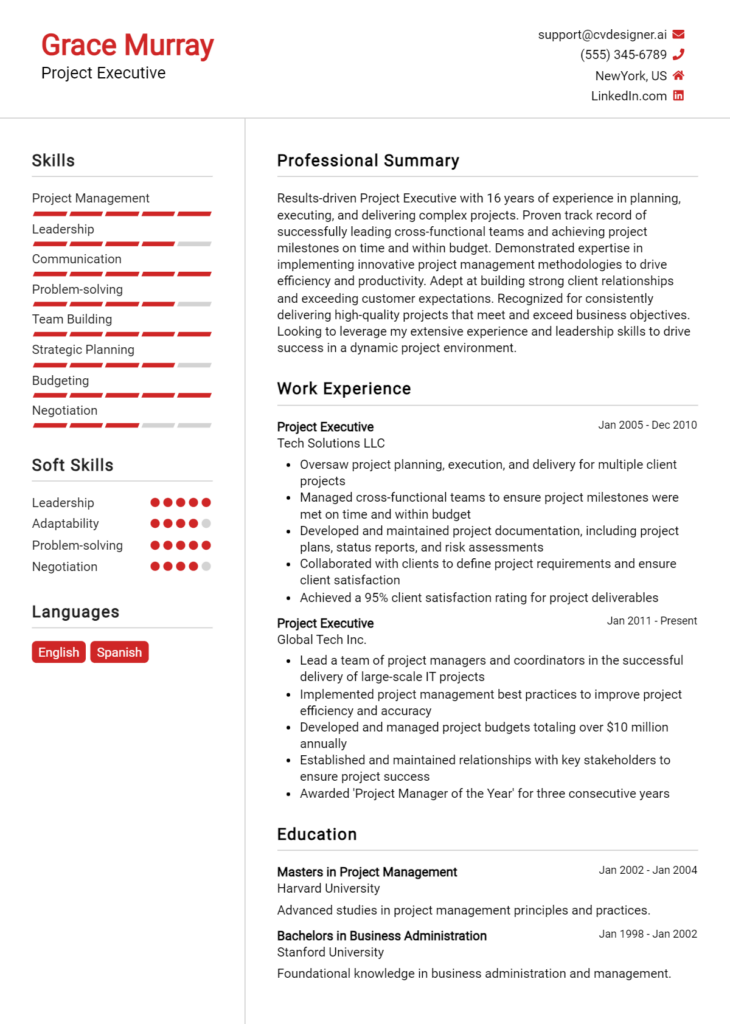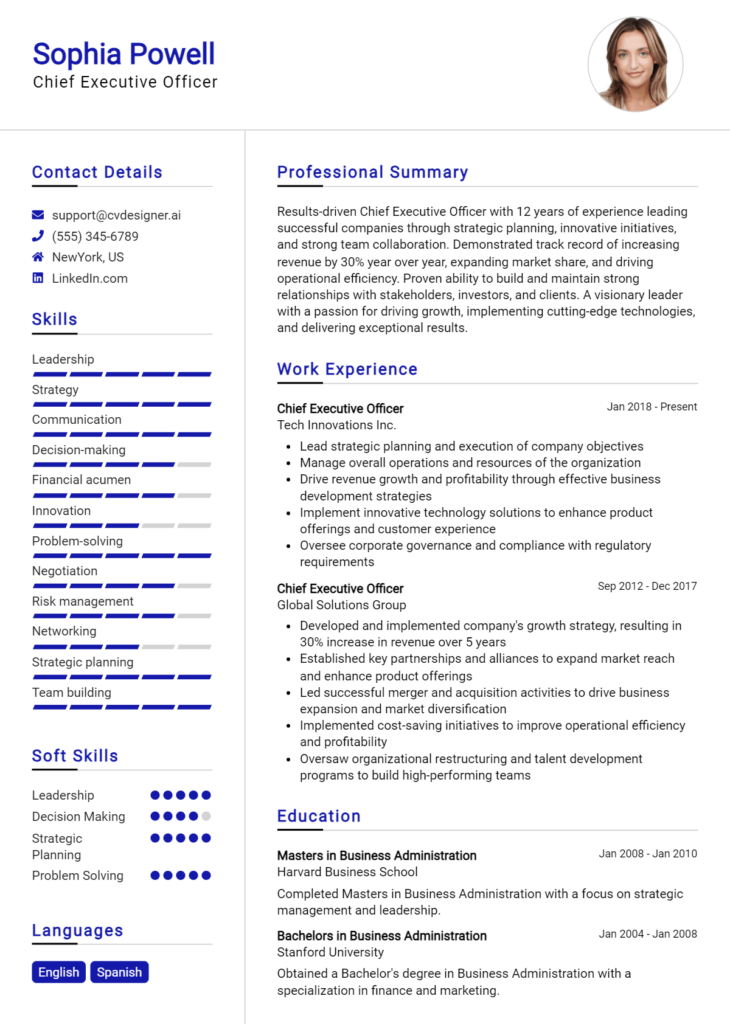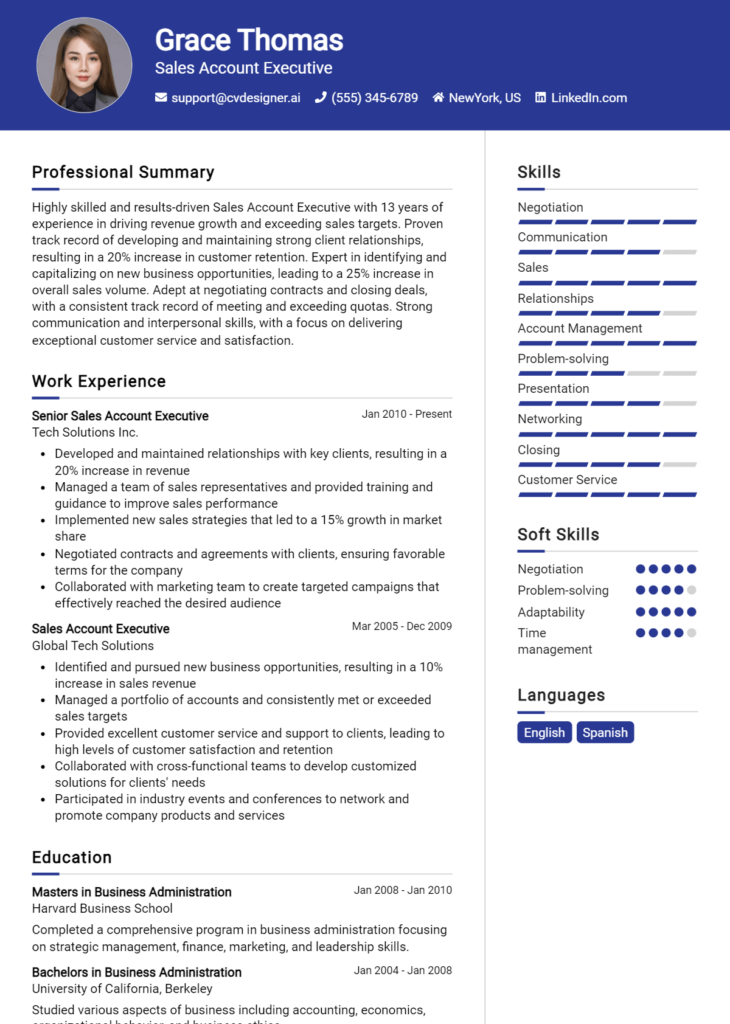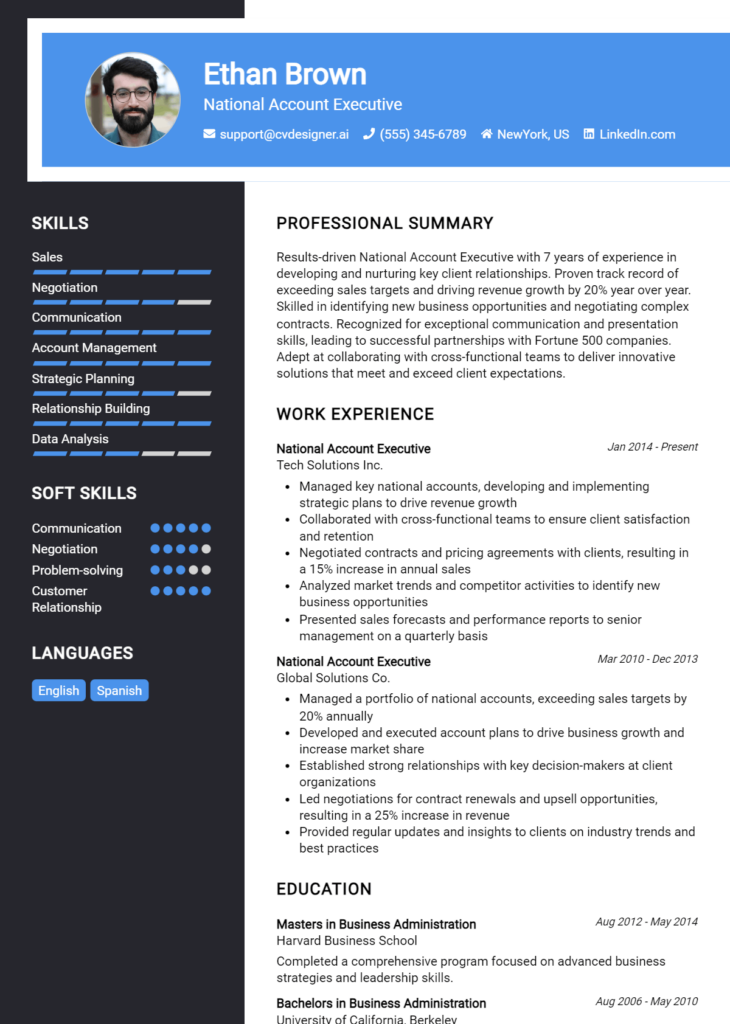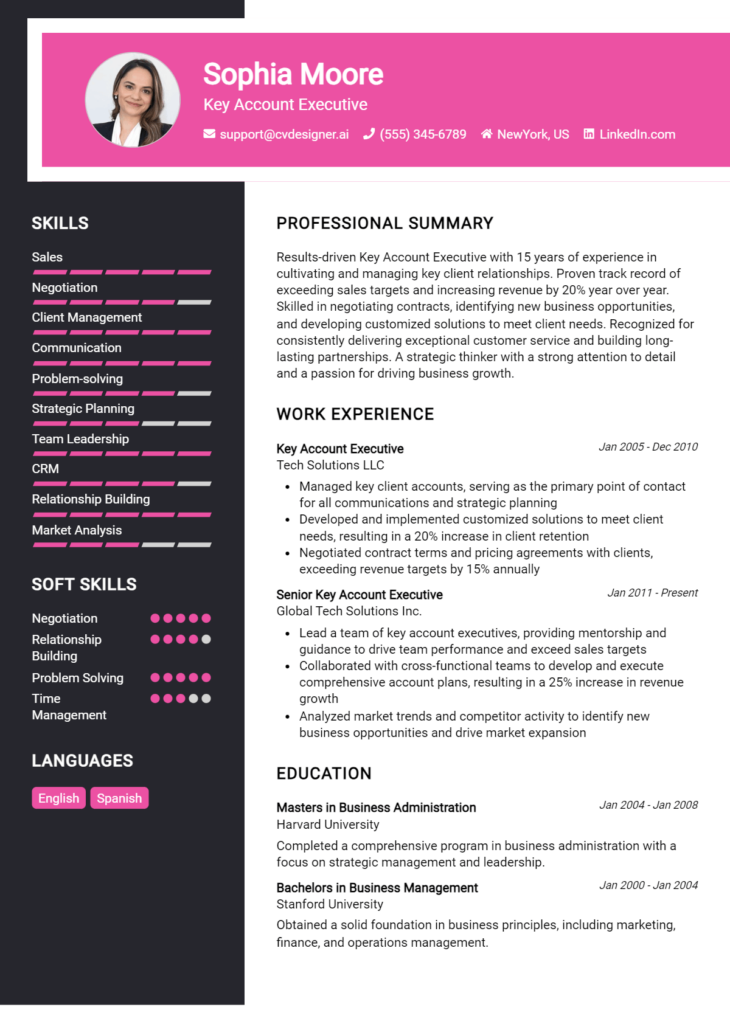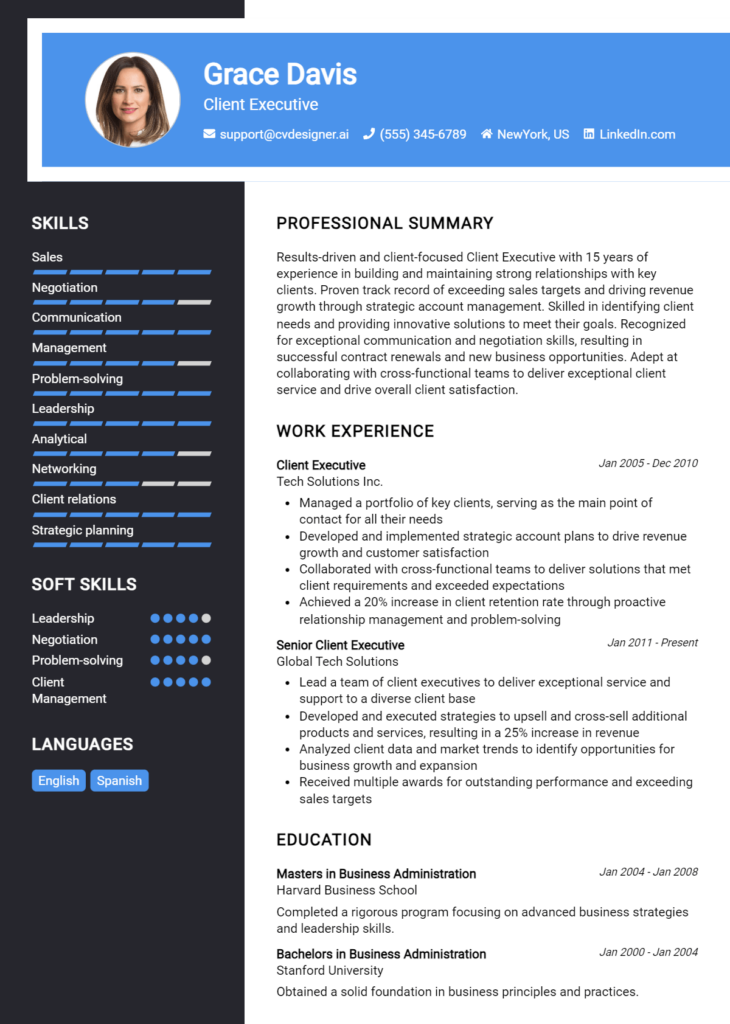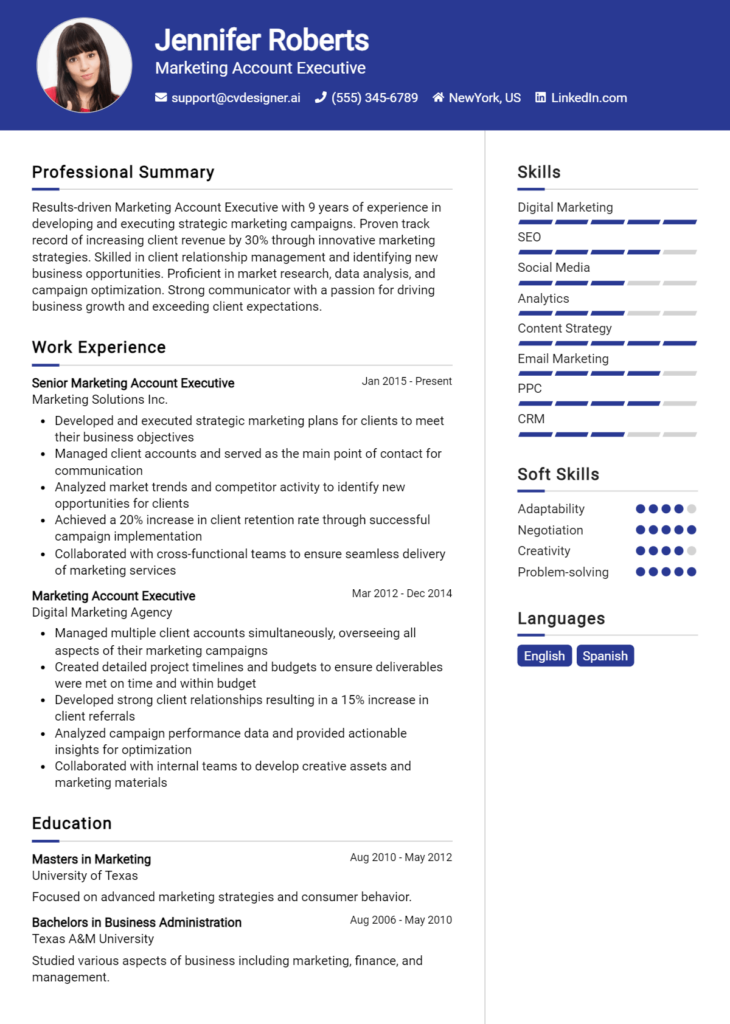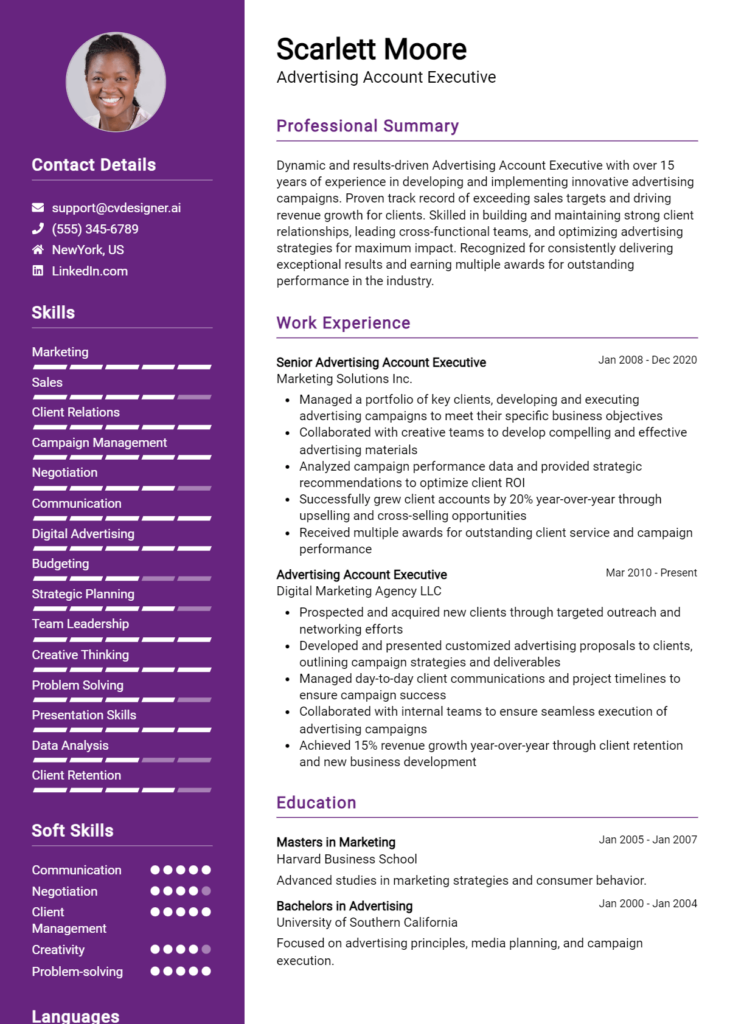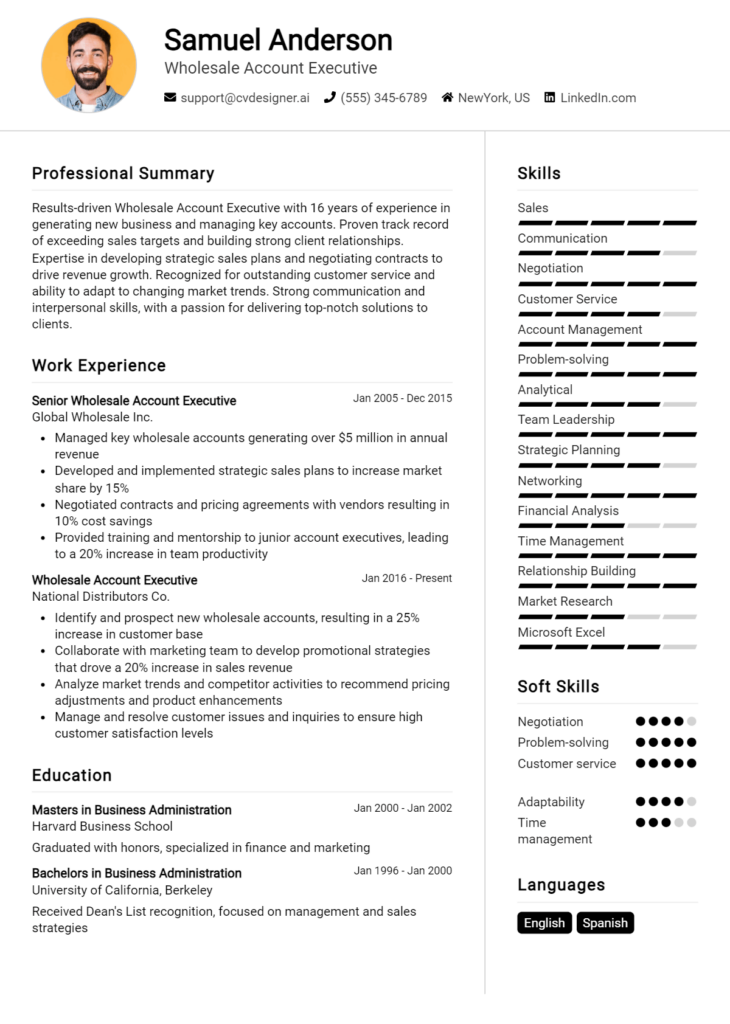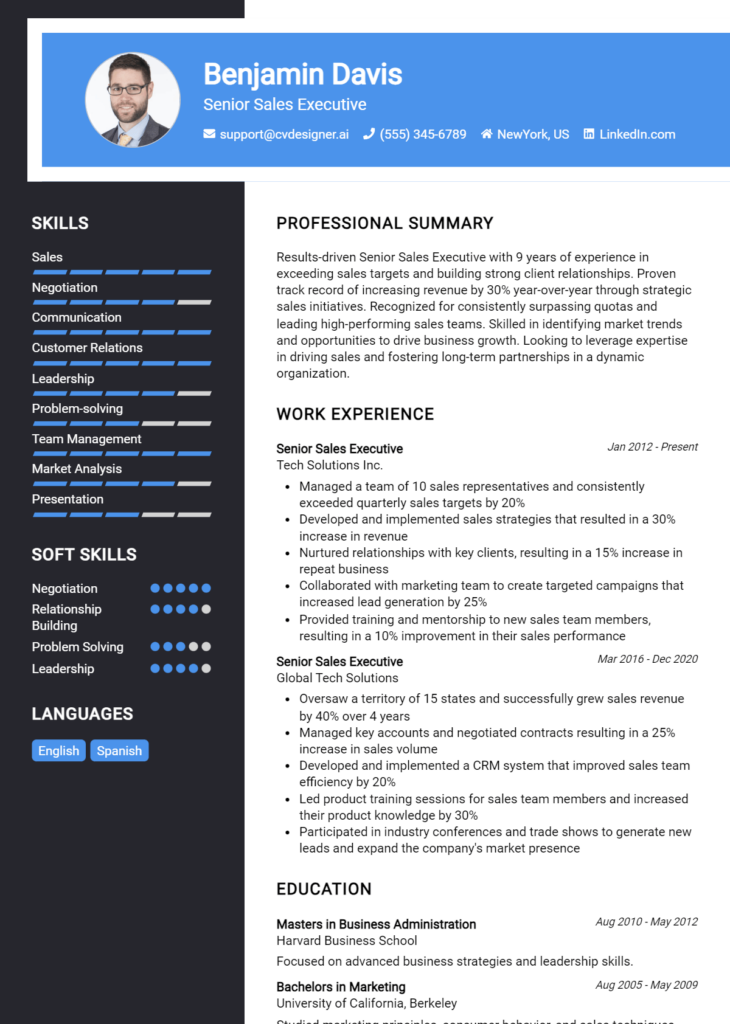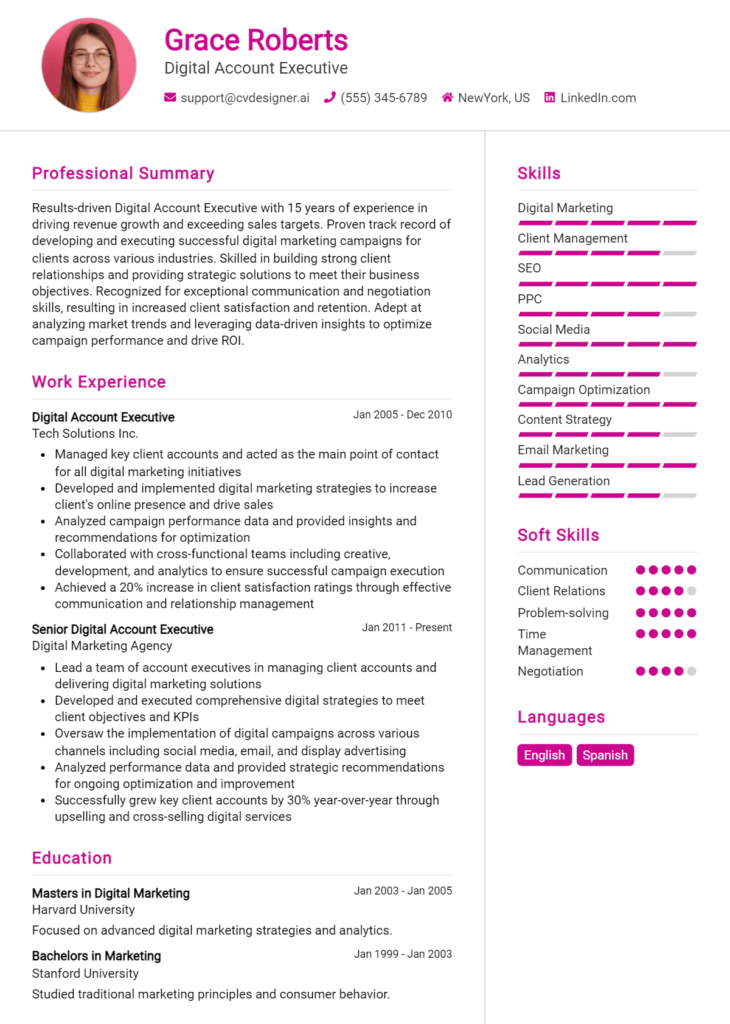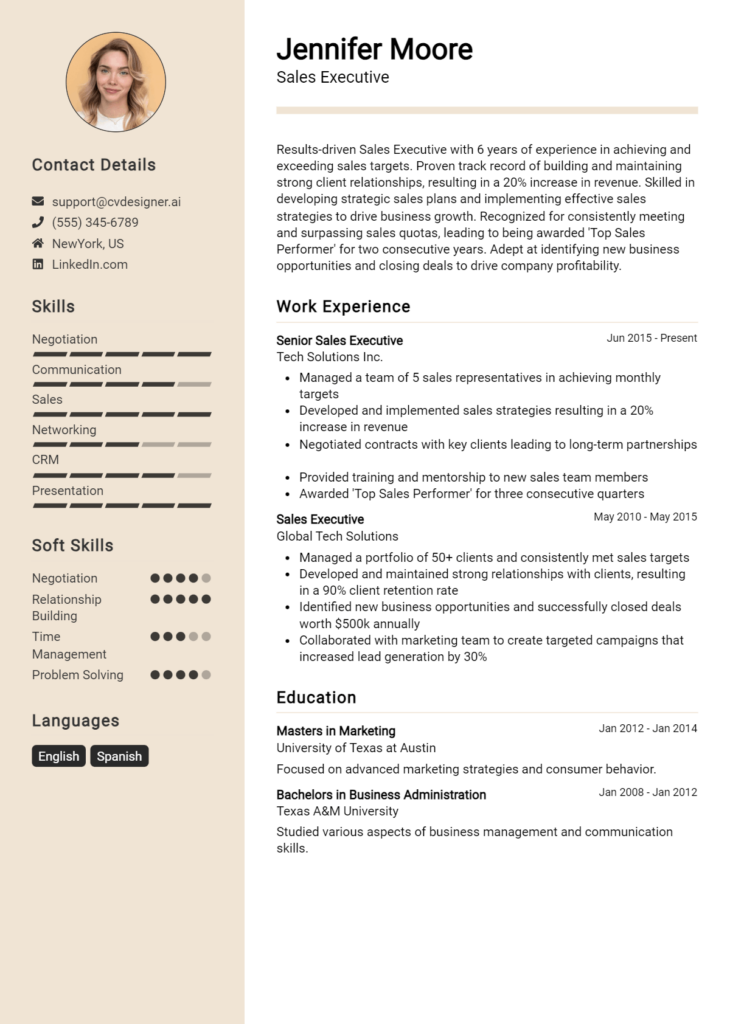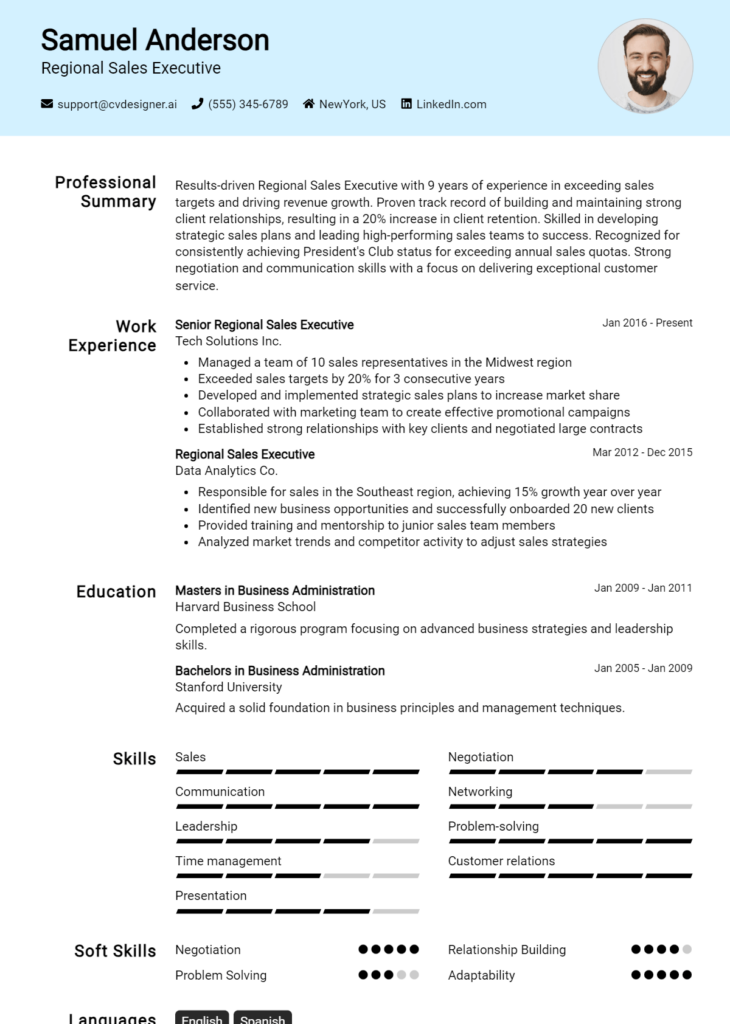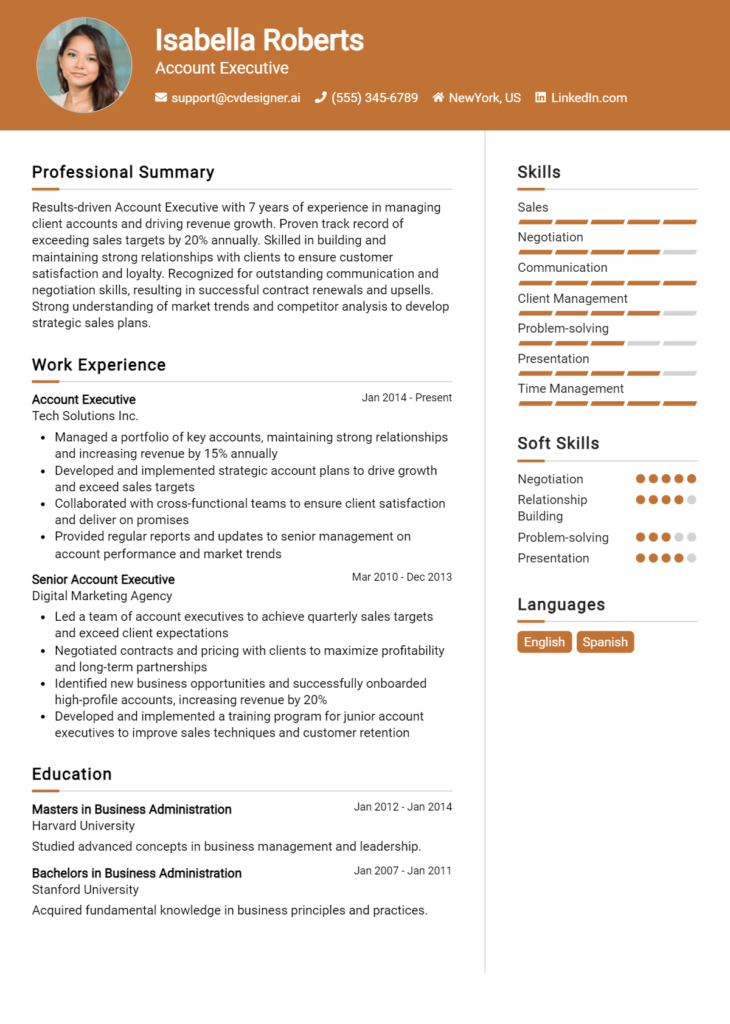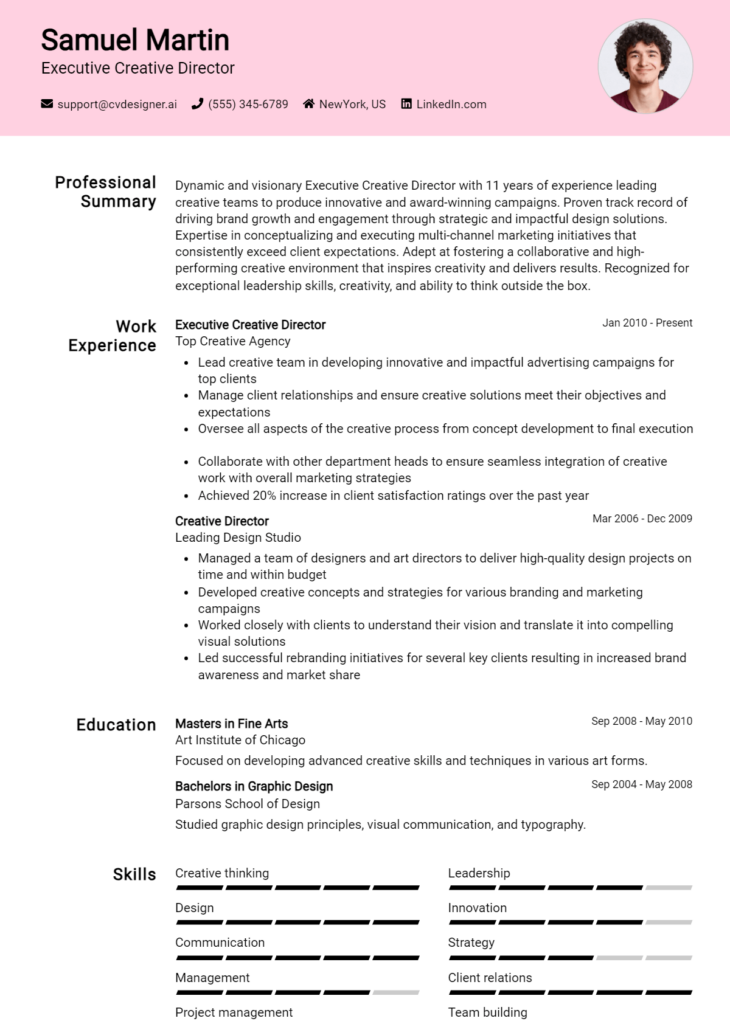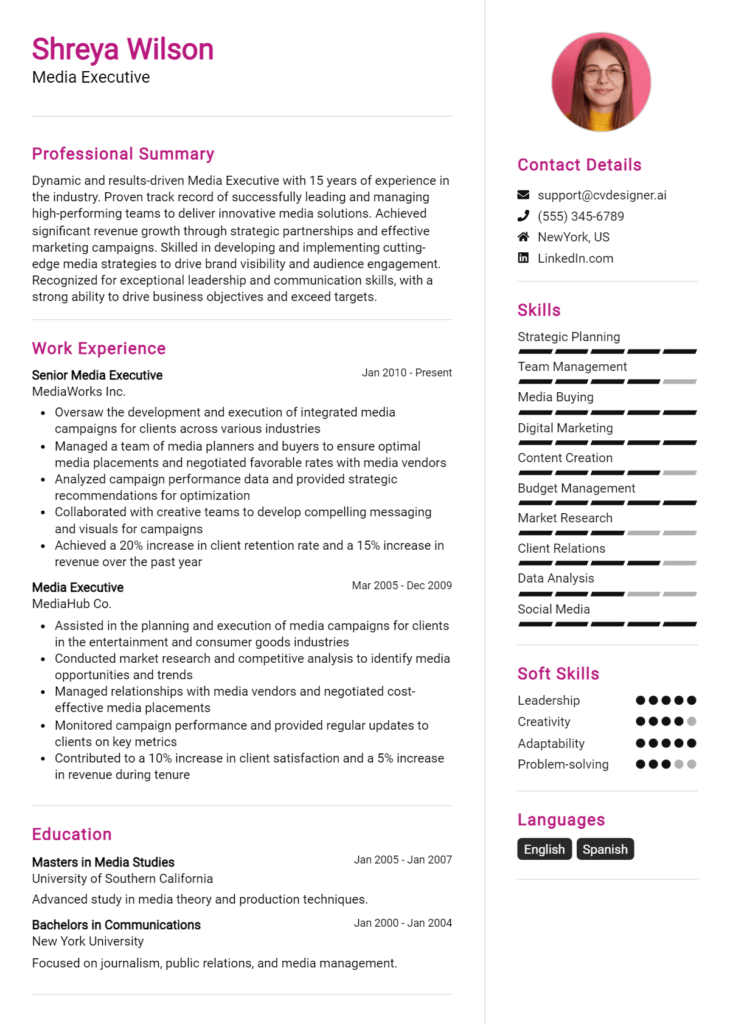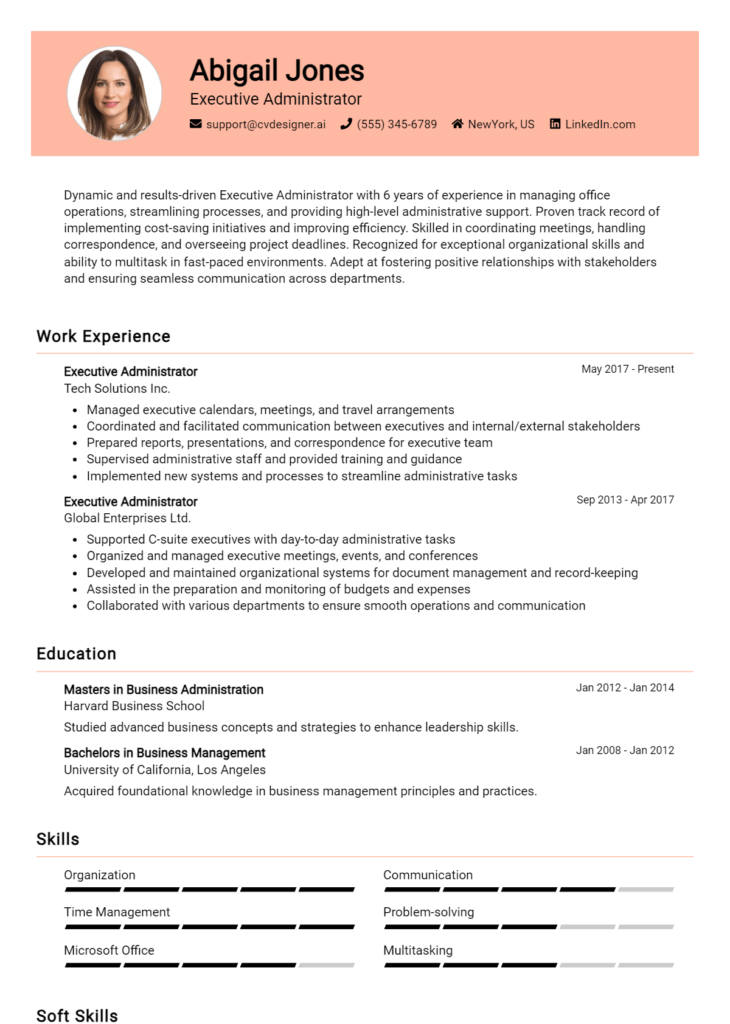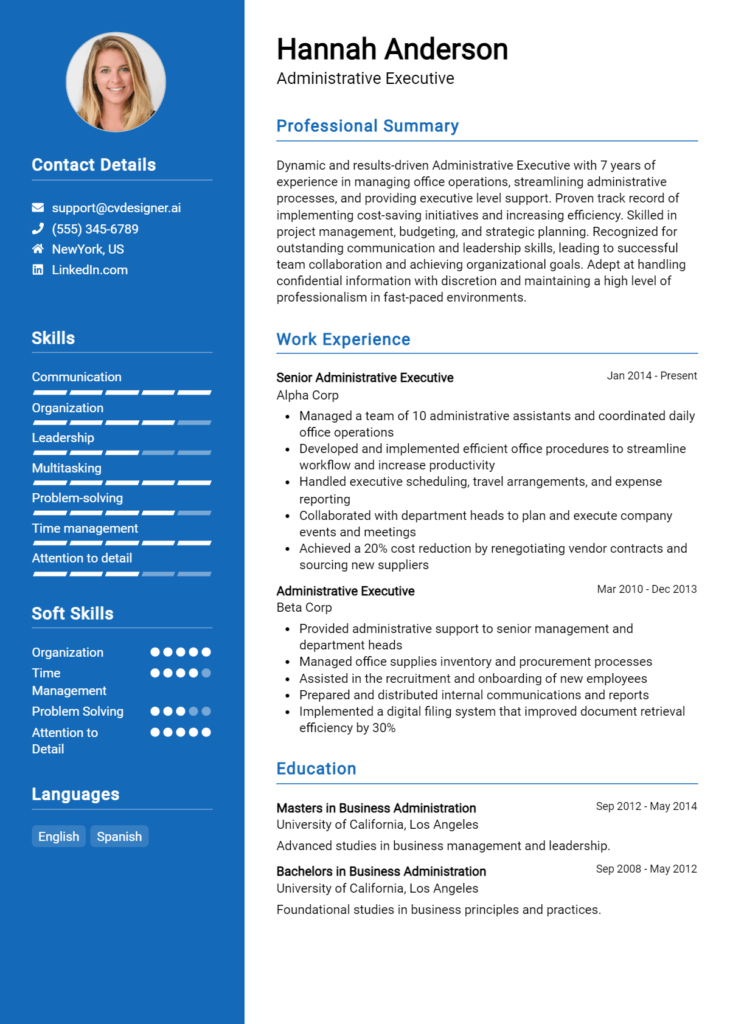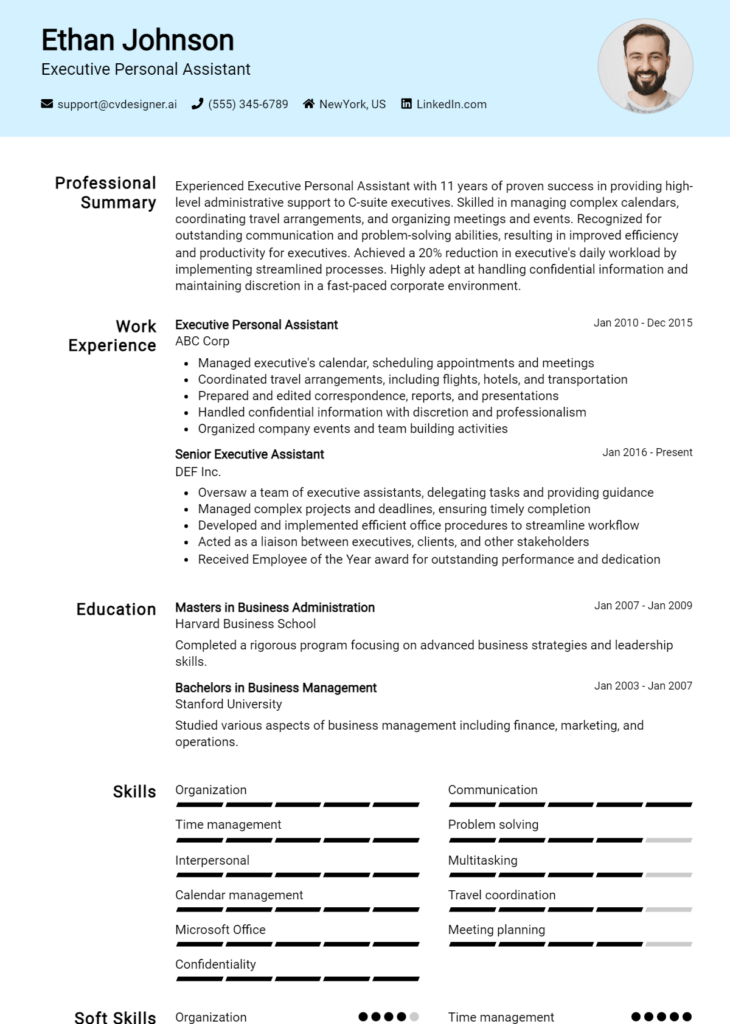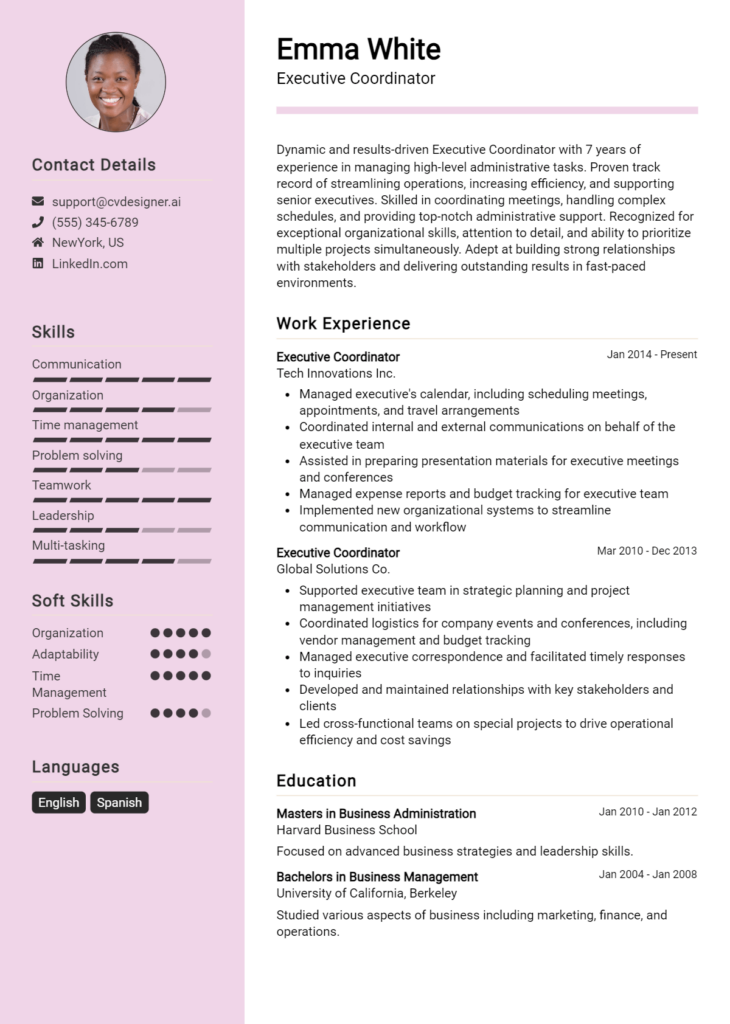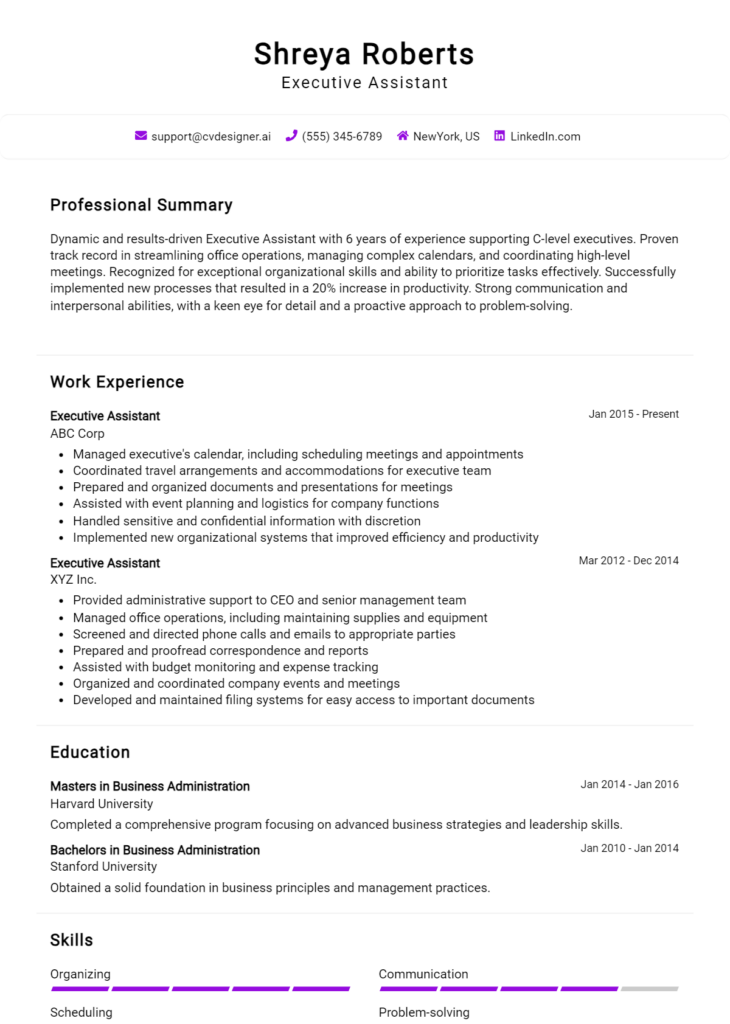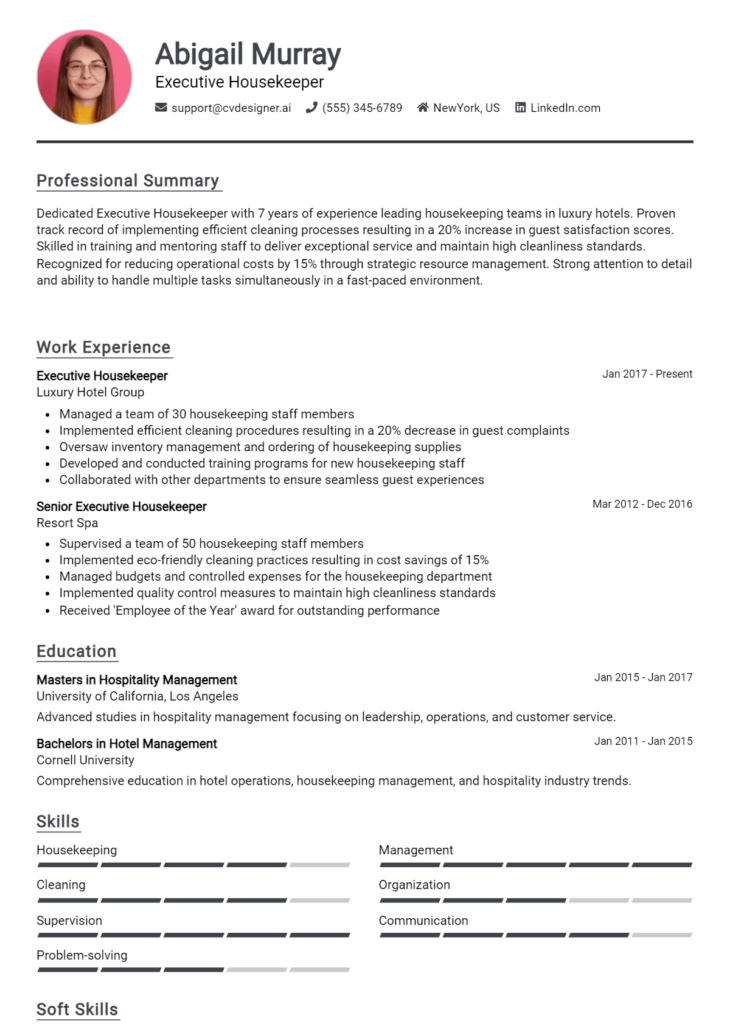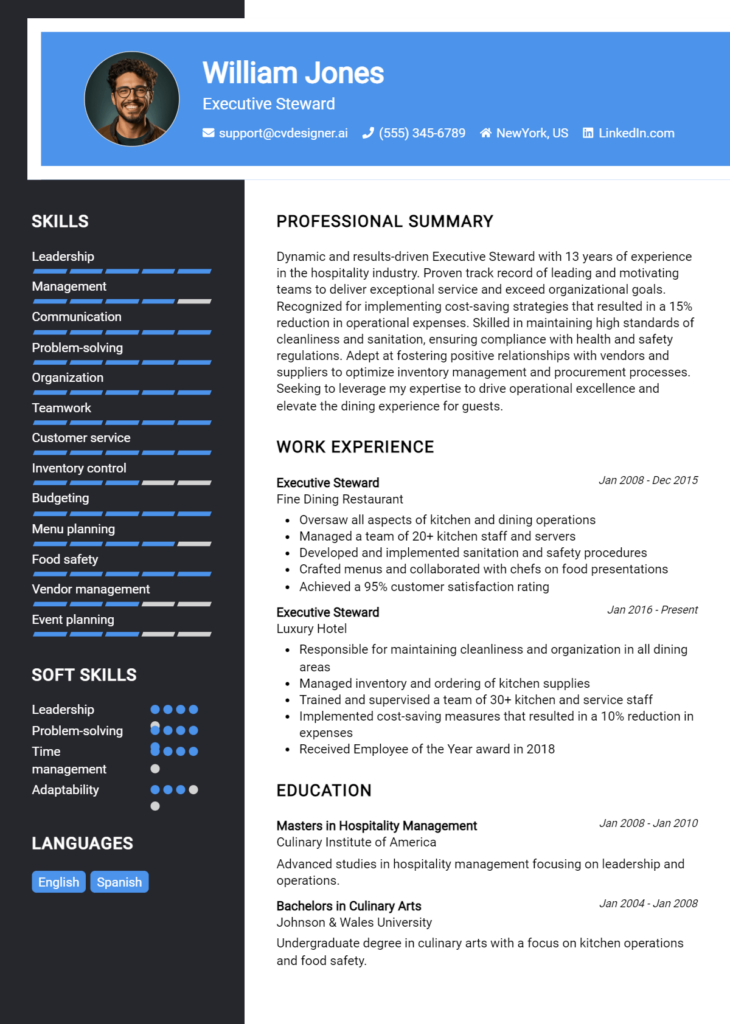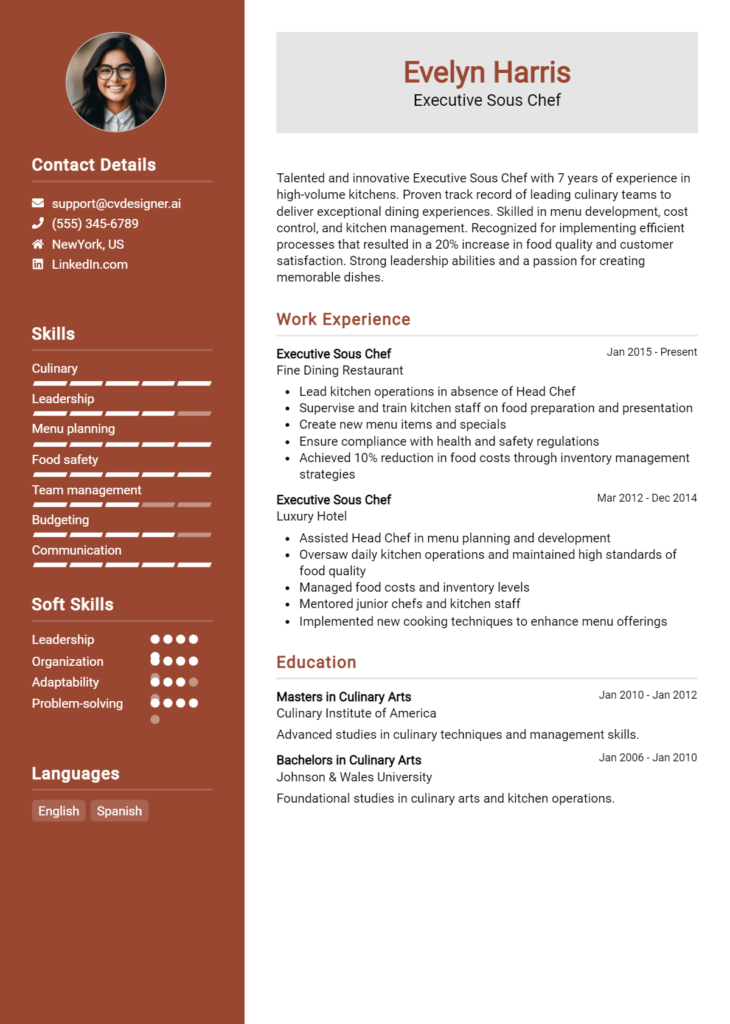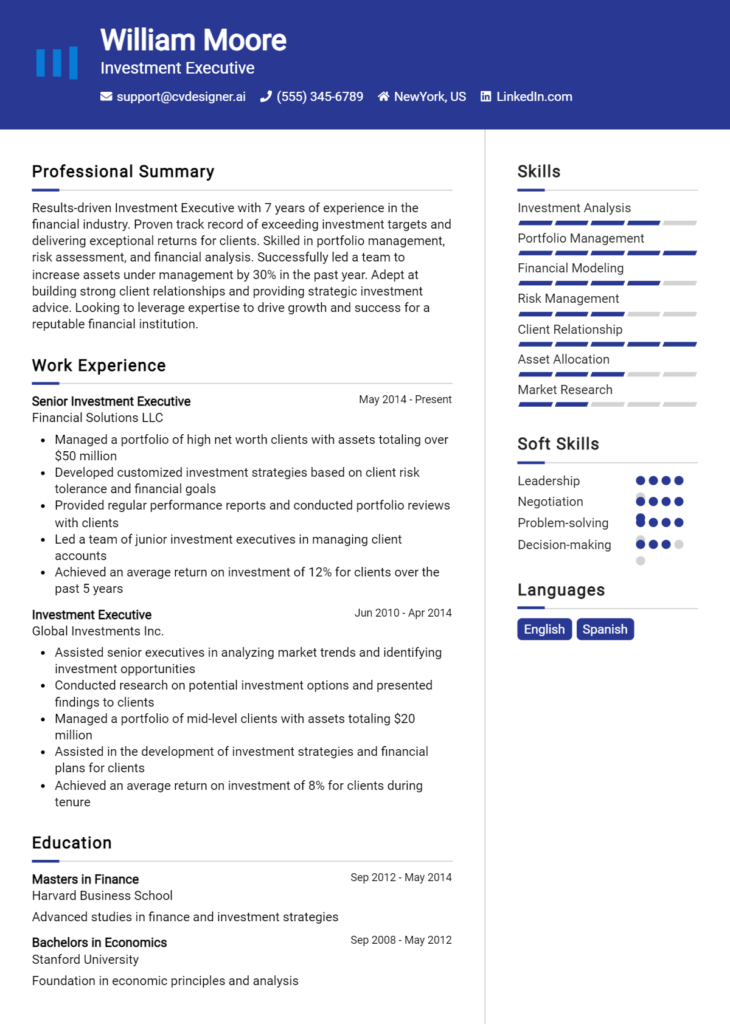Most Popular Executive Chef Resume Examples
Explore additional Executive Chef resume samples and guides and see what works for your level of experience or role.
As an Executive Chef, you hold the key to culinary excellence, orchestrating a symphony of flavors that delight diners and elevate dining experiences. Your expertise not only shapes the menu but also influences the entire kitchen team, setting the standard for quality and creativity. In such a competitive industry, a well-crafted resume is essential to showcase your unique talents, leadership abilities, and culinary achievements. Whether you’re aiming for a prestigious restaurant, a luxury hotel, or a catering company, a strong resume can make all the difference in landing your dream position.
In this comprehensive guide to Executive Chef resume writing, we'll explore the vital components that make your resume stand out. You'll learn about the core responsibilities and skills that should be highlighted to reflect your expertise and experience. We’ll discuss the best formats to use to present your information clearly and effectively, along with common mistakes to avoid that could hinder your chances of getting noticed. Furthermore, we will provide resume examples tailored for all experience levels, ensuring you find inspiration regardless of your career stage. You’ll also receive valuable tips on crafting your resume and guidance on selecting the right resume templates to match your professional persona. Get ready to elevate your resume to match the culinary heights of your career!
Key Responsibilities and Skills for a Executive Chef
As an Executive Chef, you play a pivotal role in overseeing the culinary operations of a restaurant or food service establishment. Your key responsibilities typically include:
- Menu Development: Designing innovative and seasonal menus that reflect the restaurant’s cuisine while considering food trends and customer preferences.
- Team Management: Leading and mentoring kitchen staff, conducting training sessions, and ensuring a high level of performance and teamwork.
- Food Quality Control: Maintaining standards for food preparation, presentation, and taste, ensuring that every dish meets the establishment's quality benchmarks.
- Inventory Management: Overseeing inventory levels, ordering supplies, managing food costs, and minimizing waste to ensure profitability.
- Health and Safety Compliance: Ensuring compliance with health and safety regulations, including food handling practices and sanitation standards.
- Budget Management: Developing and managing the kitchen budget, including labor costs and food expenses, to achieve financial targets.
Essential skills required for an Executive Chef include:
- Culinary expertise and creativity
- Leadership and team-building abilities
- Strong organizational skills
- Knowledge of food safety and sanitation regulations
- Proficient in inventory and cost management
- Excellent communication skills
- Ability to work under pressure and in a fast-paced environment
Highlighting these skills effectively in the resume skills section is crucial. Employers often look for specific competencies that align with the job description, so tailoring your listed skills to match the requirements of the position can significantly enhance your chances of securing an interview. Consider how your experience and these key skills can be reflected in a strong CV, showcasing not just what you can do but how you can contribute to the success of the establishment you aim to join.
Best Resume Format and Structure for a Executive Chef
When crafting a resume for the role of Executive Chef, it's crucial to choose a format that highlights your culinary expertise, leadership skills, and professional achievements. The best resume format for an Executive Chef typically follows a chronological or combination format, as it emphasizes your work history and skills effectively. Here’s a detailed guide on the key sections to include and tips for each.
Contact Information
- Start with your name at the top, followed by your phone number, email address, and LinkedIn profile (if applicable). Ensure your email address is professional.
- Include your physical address or at least your city and state, as this can help employers gauge your location relative to the job.
Professional Summary
- Write a concise 2-4 sentence summary that captures your culinary philosophy, years of experience, and key achievements. Focus on your leadership abilities, menu development skills, and any specialties you may have.
- Tailor this section to reflect the specific job you’re applying for, incorporating keywords from the job description.
Work Experience
- List your work experience in reverse chronological order, starting with your most recent position. Include the job title, name of the establishment, location, and dates of employment.
- For each role, use bullet points to outline your responsibilities and accomplishments. Focus on quantifiable achievements (e.g., “Increased restaurant revenue by 20% through innovative menu design”).
- Highlight your experience in managing kitchen staff, overseeing food preparation, and ensuring compliance with health and safety regulations.
Education
- Include your highest level of education first. This section should list the degree obtained, the institution’s name, and graduation year.
- If you attended culinary school or obtained any relevant certifications (like a degree in Culinary Arts), make sure to highlight this.
Skills
- Create a section dedicated to your culinary and managerial skills. This can include both hard skills (e.g., knowledge of various cuisines, food safety regulations) and soft skills (e.g., team leadership, communication).
- Tailor this list to match the job description, ensuring to include any specific skills mentioned by the employer.
Certifications
- List any relevant certifications, such as ServSafe, culinary certifications, or management training. Include the certifying body and the date obtained.
- If applicable, mention any awards or recognitions received in your culinary career (e.g., Michelin stars, local awards).
Tips for Formatting
- Use a clean, professional layout with consistent font and spacing throughout your resume.
- Keep your resume to one or two pages, depending on your experience level.
- Use bold headings and bullet points to improve readability.
- Avoid using excessive jargon; ensure clarity for anyone reviewing your resume.
When it comes to complementing your resume with a cover letter, maintain a consistent theme in terms of fonts, colors, and overall layout. Your cover letter should further elaborate on the points made in your resume, showcasing your passion for culinary arts and detailing why you are the right fit for the position. Use a similar professional tone and ensure that both documents reflect your brand as an Executive Chef.
Writing Tips and Best Practices for a Executive Chef Resume
When crafting a resume for the role of Executive Chef, it's crucial to highlight your culinary expertise, leadership skills, and the impact you've made in previous positions. Use a clean and professional format to ensure your resume is easy to read, and don't forget to integrate relevant industry-specific keywords that will catch the eye of hiring managers and applicant tracking systems. Action verbs will help convey your accomplishments dynamically, while quantifying your achievements will provide concrete evidence of your capabilities. Remember to apply these best practices not only to your resume but also to your cover letter for a cohesive application.
- Use action verbs such as "developed," "managed," and "innovated" to describe your responsibilities and achievements.
- Quantify your successes by including metrics, like "increased revenue by 20%" or "managed a team of 15 chefs."
- Incorporate industry-specific keywords related to culinary techniques, menu development, and kitchen management to demonstrate your expertise.
- Tailor your resume to the specific job you're applying for by mirroring language from the job description.
- Highlight your leadership and team-building skills, as these are critical for an Executive Chef role.
- Include any relevant certifications, awards, or training that set you apart from other candidates.
- Ensure the format is professional and visually appealing, utilizing bullet points for clarity and easy reading.
- Refer to resume writing tips to further enhance your document's presentation and effectiveness.
Common Mistakes to Avoid in a Executive Chef Resume
Creating a compelling Executive Chef resume is essential for standing out in a competitive culinary job market. However, many aspiring chefs make common mistakes that can undermine their chances of landing an interview. To craft a resume that highlights your skills and experiences effectively, it's crucial to avoid these pitfalls:
- Overloading the resume with excessive information that detracts from key qualifications.
- Using generic descriptions that fail to showcase unique culinary skills or achievements.
- Failing to tailor the resume to specific job descriptions, leading to a lack of relevance.
- Neglecting to include quantifiable achievements, such as revenue growth or customer satisfaction ratings.
- Ignoring formatting and design, resulting in a cluttered or unprofessional appearance.
- Using passive language instead of active verbs that convey leadership and initiative.
- Omitting important certifications or training relevant to the culinary field.
- Including irrelevant work experiences that do not relate to the position of Executive Chef.
- Not proofreading for spelling and grammatical errors, which can reflect poorly on attention to detail.
- Overlooking the importance of a strong summary or objective statement that captures your career goals.
To avoid these errors, consider reviewing the common mistakes to avoid in a resume. Additionally, don’t forget to check out the common cover letter mistakes that should also be avoided to ensure a complete and polished application package.
Sample Executive Chef Resumes
An Executive Chef plays a pivotal role in the culinary world, overseeing kitchen operations, menu creation, and staff management. Crafting an effective resume is essential for showcasing your culinary skills, leadership abilities, and experience in the hospitality industry. Below are three sample resumes for an Executive Chef position, tailored to different levels of expertise and career paths.
Experienced Executive Chef Resume
John Smith
123 Culinary Lane
Gourmet City, CA 90210
(555) 123-4567
john.smith@email.com
Professional Summary
Dynamic and passionate Executive Chef with over 15 years of experience in high-end restaurants and hotels. Proven track record of creating innovative menus, managing kitchen staff, and optimizing food costs while maintaining high standards of quality and presentation. Adept at fostering a collaborative kitchen environment and training culinary teams to excel.
Experience
Executive Chef
Gastronomy Fine Dining, Gourmet City, CA
June 2015 – Present
- Developed seasonal menus that increased customer satisfaction ratings by 30%.
- Managed a diverse team of 20 culinary professionals, providing guidance and training, leading to a 25% reduction in staff turnover.
- Oversaw kitchen operations, ensuring compliance with health and safety regulations and maintaining a 5-star cleanliness rating.
Sous Chef
Epicurean Delight Hotel, Gourmet City, CA
January 2010 – May 2015
- Assisted the Executive Chef in menu planning and kitchen management, contributing to a 15% increase in annual revenue.
- Implemented cost-control measures that reduced food waste by 20%.
- Trained and mentored junior chefs, many of whom advanced to lead roles.
Education
Culinary Arts Degree
Culinary Institute of America, Hyde Park, NY
Graduated: May 2008
Entry-Level Executive Chef Resume
Emily Johnson
456 Flavor Street
Culinary Town, FL 32100
(555) 987-6543
emily.johnson@email.com
Professional Summary
Ambitious culinary graduate with a passion for food and a desire to develop a career as an Executive Chef. Recently completed an internship at a bustling restaurant, where I honed my culinary skills and learned the importance of teamwork and creativity in the kitchen. Eager to bring fresh ideas and a strong work ethic to a dynamic team.
Experience
Culinary Intern
Taste Buds Bistro, Culinary Town, FL
June 2023 – August 2023
- Assisted chefs in preparing and presenting high-quality dishes for daily service.
- Engaged in inventory management and food preparation tasks, gaining hands-on experience in a fast-paced kitchen.
- Collaborated with kitchen staff to maintain cleanliness and organization, contributing to a positive work environment.
Education
Culinary Arts Diploma
Culinary Institute of Florida, Culinary Town, FL
Graduated: May 2023
Career Changer Executive Chef Resume
Michael Davis
789 Savory Avenue
Flavor City, TX 45678
(555) 654-3210
michael.davis@email.com
Professional Summary
Dedicated professional transitioning from a successful career in event management to the culinary field. Completed a culinary arts program and gained practical experience through volunteering at various community kitchens. Equipped with strong organizational skills, leadership experience, and a passion for creating memorable dining experiences.
Experience
Event Manager
Elite Events Co., Flavor City, TX
January 2015 – December 2022
- Coordinated logistics for high-profile events, managing budgets of up to $100,000 and working with various catering teams.
- Developed strong relationships with vendors and clients, ensuring successful event execution and client satisfaction.
- Demonstrated exceptional leadership skills by leading a team of 10 event staff and training new hires.
Volunteer Cook
Community Kitchen, Flavor City, TX
March 2023 – Present
- Prepared meals for community outreach programs, focusing on nutrition and presentation to promote healthy eating.
- Assisted in menu planning and food procurement, gaining valuable experience in culinary operations.
Education
Culinary Arts Program
Culinary Academy of Texas, Flavor City, TX
Graduated: February 2023
For more inspiration, explore additional resume templates. To complement your application, consider reviewing corresponding cover letter examples that can enhance your job application package.
Checklist for a Executive Chef Resume
- Proofread for Spelling and Grammar: Carefully review your resume for any typos or grammatical errors. Consider using a grammar-check tool or asking a friend to review it.
- Ensure Consistency in Formatting: Check that fonts, sizes, bullet points, and spacing are consistent throughout the document. This helps create a professional appearance.
- Tailor the Resume to the Job Description: Highlight experiences and skills that align with the specific requirements of the Executive Chef position you are applying for.
- Use Action Verbs: Begin bullet points with strong action verbs like "developed," "managed," or "innovated" to convey a sense of leadership and impact.
- Quantify Achievements: Where possible, include metrics or specific examples of your contributions, such as "increased kitchen efficiency by 20%" or "managed a team of 15 chefs."
- Highlight Relevant Skills: Ensure that you showcase both culinary skills and managerial abilities, such as menu planning, team leadership, and cost control.
- Include Certifications and Training: List relevant culinary certifications, training programs, or continuing education that demonstrate your expertise and commitment to the field.
- Keep It Concise: Aim for a one-page resume unless you have extensive experience. Be succinct and focus on the most relevant information.
- Use an AI Resume Builder: Consider using an AI resume builder to help format and organize your resume effectively.
- Adapt for Other Documents: Remember that a similar checklist can be followed for creating a CV or cover letter to ensure all your job application materials are polished and professional.
Key Takeaways for a Executive Chef Resume Guide
Crafting a compelling resume as an Executive Chef is essential to showcase your culinary expertise, leadership skills, and passion for the culinary arts. By utilizing the provided examples and tips, you can create a strong resume that stands out to potential employers. Remember to emphasize your unique experiences, achievements, and the specific skills that make you an ideal candidate for the role.
As you embark on this journey, consider downloading a template from resume templates to streamline your process. You can also explore our cover letter templates to complement your resume with a personalized touch. For a more hands-on approach, our best resume maker can assist you in designing a professional resume tailored to your needs.
Additionally, following similar guidelines will enhance your ability to craft a compelling CV and an impactful cover letter. Take the next step towards your culinary career success by leveraging these resources today!
